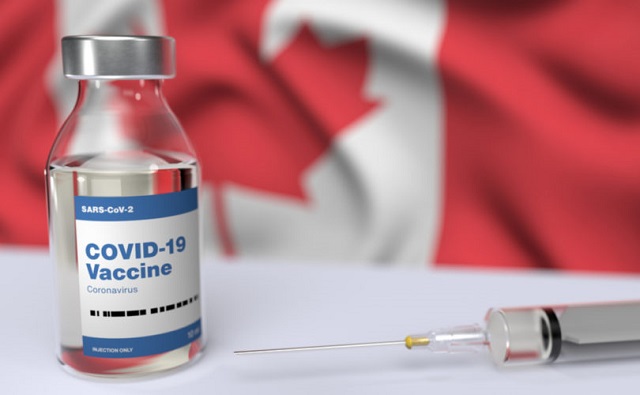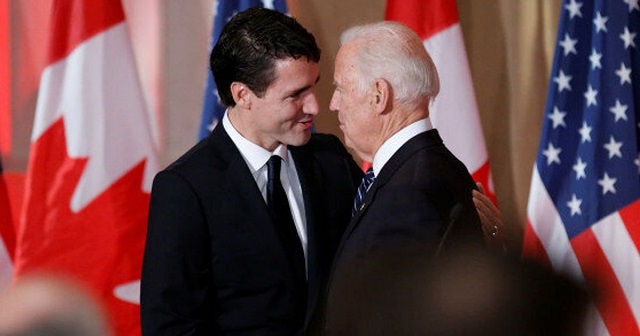COVID-19
Police officer challenges harsh discipline in free speech case

From the Justice Centre for Constitutional Freedoms
The Justice Centre announces that the Ontario Civilian Police Commission will hear the appeal of Constable Michael Brisco today, who is challenging his conviction and penalty for donating to the Ottawa Freedom Convoy in early 2022. This case raises questions about the Charter’s protection for freedom of expression, the right of police officers to support political causes while off duty, and the privacy rights of all Canadians.
Constable Michael Brisco of the Windsor Police Service is a highly trained and respected police officer with no prior disciplinary record. He made a $50 donation to the peaceful Freedom Convoy protest through the GiveSendGo fundraising platform on February 8, 2022 – one day after an Ontario Superior Court Judge held that people could continue to engage in “peaceful, lawful and safe protest” in Ottawa so long as honking ceased. When making his donation, Constable Brisco did not identify himself as a police officer and did not contribute to the protest in his capacity as a police officer.
Days later, the GiveSendGo donor list was hacked. The Ontario Provincial Police Service acquired the list and forwarded a set of names to the Windsor Police Service, who discovered that Constable Brisco had donated to the protest.
The Windsor Police Service then chose to charge Constable Brisco for “discreditable conduct.”
After a six-day hearing before an Ontario Provincial Police Adjudicator, Constable Brisco was found guilty of discreditable conduct by a Tribunal on March 24, 2023. Two months later, on May 18, 2023, the Tribunal ordered that Constable Brisco should forfeit pay for 80 hours of work as a penalty.
With the support of the Justice Centre, on June 14, 2023, Constable Brisco filed a Notice of Appeal with Ontario Civilian Police Commission, challenging his conviction and the imposed penalty.
Counsel for Constable Brisco argue that the prosecution against him lacks sufficient evidence. The claim that the Freedom Convoy in Ottawa was an unlawful protest rested entirely on claims made in newspaper articles by various officials, including the Prime Minister and the Premier of Ontario. No credible video, photographic, or other evidence on this point was filed against Constable Brisco. Further, counsel for Constable Brisco argue that the evidence against him – a hacked list that ought to have remained private and confidential – was obtained illegally. Counting the donor list as evidence against Constable Brisco amounts to an abuse of process, counsel argue.
Brisco’s legal counsel further argue that his conviction and penalty rested on a claim that Mr. Brisco’s donation was a demonstration of support for the Ambassador Bridge blockade in Windsor, Ontario; Mr. Brisco argues that there is no evidence of a link between the Ottawa protest and the Windsor blockade, and he denied any support for the blockade during his hearing.
Finally, Constable Brisco argues that the Tribunal’s decisions to convict and discipline him fail to acknowledge or proportionately balance their impact on his Charter-protected right to freedom of expression. While a police officer’s right to free expression is limited during the performance of their duties as officers, Constable Brisco did not donate to the Freedom Convoy in his capacity as a police officer. He also expected the donation to be confidential, and he did not seek to advertise his giving. The expression of off-duty police officers is protected by the Charter to the same degree as the expression of any other citizen.
Darren Leung, one of the lawyers for Constable Brisco, stated, “Freedom of expression is a right that is guaranteed to all Canadians. Police officers are also entitled to express their political beliefs, so long as they do it without identifying themselves as police. Furthermore, it is an injustice that Constable Brisco was investigated on the basis of illegally obtained information. Instead of investigating who was responsible for the hack, the Windsor Police Service have dedicated their resources in prosecuting Constable Brisco.”
“Every Canadian, including police and also including doctors, nurses, teachers and other regulated professionals, has a right to donate to the cause of her or his choice, and to do so privately and confidentially. No Canadian should face disciplinary proceedings at the hands of her or his professional association for expressing support for a cause or movement,” stated John Carpay, President of the Justice Centre.
COVID-19
Canada’s COVID vaccine injury program has paid out just 6% of claims so far

From LifeSiteNews
Data from Canada’s Vaccine Injury Support Program shows that to date, only 138 of the 2,233 claims have been approved by a medical board for a payout.
Canada’s program for those injured by the COVID vaccines, which the federal government still insists are safe, has only paid out 6 percent of the claims made.
A look at the data from the nation’s Vaccine Injury Support Program (VISP) shows that to date, only 138 of the 2,233 claims made to the program have been approved by a medical board for payout.
Some 2,069 claims have had an “administrative review completed” with 1,825 being deemed “admissible,” but remain in the process of “being depersonalized and prepared to move forward to a preliminary medical review.” Some 620 claims have been assessed by the Medical Review Board but are still under review.
Total payouts so far stand around $11.2 million, with the number of people filing claims to the program growing steadily.
LifeSiteNews recently reported that the Liberal government of Prime Minister Justin Trudeau’s recently tabled 2024 budget earmarked an extra $36 million for the program.
Some people who were successful in getting payouts from VISP have said that the compensation awarded was insufficient considering the injuries sustained from the COVID shots.
As reported by LifeSiteNews last year, 42-year-old Ross Wightman from British Columbia launched a lawsuit against AstraZeneca, the federal government of Canada, the government of his province, and the pharmacy at which he was injected after receiving what he considers inadequate compensation from VISP.
He was one of the first citizens in Canada to receive federal financial compensation due to a COVID vaccine injury under VISP. Wightman received the AstraZeneca shot in April 2021 and shortly after became totally paralyzed. He was subsequently diagnosed with Guillain-Barré Syndrome.
Whitman was given a one-time payout of $250,000 and about $90,000 per year in income replacement, but noted, as per a recent True North report, that he does not even know if those dollar amounts “would ease the pain.”
“Given the extent of the permanent life-changing injuries, a couple hundred thousand dollars isn’t much, that’s for sure,” he said.
All Canadian provinces except Quebec are covered by VISP, who has its own vaccine compensation program that also appears to be slow at paying out to applicants.
Yesterday, LifeSiteNews reported about a 30-year-old Quebec man who developed a severe skin condition after taking Moderna’s mRNA experimental COVID-19 shot. He still has not heard anything from the provincial government regarding compensation through its vaccine injury program despite the debilitating nature of his condition.
Despite the need for a federal program to address those injured by the vaccines once mandated by the Trudeau government, Health Canada still says “[I]t’s safe to receive a COVID-19 vaccine following infection with the virus that causes COVID-19. Vaccination is very important, even if you’ve had COVID-19.”
The federal government is also continuing to purchase COVID jabs despite the fact the government’s own data shows that most Canadians are flat-out refusing a COVID booster injection.
Indeed, records show the federal government has spent approximately $9.9 million on social media advertising to promote the
COVID-19
States move to oppose WHO’s ‘pandemic treaty,’ assert states’ rights

From LifeSiteNews
Utah and Florida passed laws intended to prevent the WHO from overriding states’ authority on matters of public health policy, and Louisiana and Oklahoma have legislation set to take effect soon pending final votes.
Two states have passed laws – and two states have bills pending – intended to prevent the World Health Organization (WHO) from overriding states’ authority on matters of public health policy.
Utah and Florida passed laws and Louisiana and Oklahoma have legislation set to take effect soon pending final votes. Several other states are considering similar bills.
The WHO member states will convene next month at the World Health Assembly in Geneva, Switzerland, to vote on two proposals – the so-called “pandemic accord” or “pandemic treaty,” and amendments to the International Health Regulations (IHR) – that would give the WHO sweeping new pandemic powers.
The Biden administration supports the two WHO proposals, but opposition is growing at the state level.
Proponents of the WHO’s proposals say they are vital for preparing humanity against the “next pandemic,” perhaps caused by a yet-unknown “Disease X.”
But the bills passed by state legislatures reflect frequently voiced criticisms that the WHO’s proposals imperil national sovereignty, medical and bodily sovereignty and personal liberties, and may lead to global vaccine mandates.
Critics also argue the WHO proposals may open the door to global digital “health passports” and global censorship targeting alleged “misinformation.”
Such criticisms are behind state legislative initiatives to oppose the WHO, on the basis that states’ rights are protected under the 10th Amendment of the U.S. Constitution. Under the 10th Amendment, all powers not delegated to the federal government are reserved to the states. Such powers, critics say, include public health policy.
Mary Holland, president of Children’s Health Defense (CHD), told The Defender:
It is encouraging to see states like Louisiana, Oklahoma, and Utah pass resolutions to clarify that the WHO has no power to determine health policy in their states. Historically, health has been the purview of state and local government, not the U.S. federal government.
There is no legitimate constitutional basis for the federal government to outsource health decision-making on pandemics to an international body. As state legislatures become aware of the WHO’s agenda, they are pushing back to assert their autonomy – and this is welcome.
Internist Dr. Meryl Nass, founder of Door to Freedom, told The Defender that, contrary to arguments that the drafters of the constitution could not foresee future public health needs, vaccines, doctors, and medicine were all in existence at the time the 10th Amendment was written. They were “deliberately left out,” she said.
READ: Thousands of protesters rally in Tokyo against proposed WHO pandemic treaty
This has implications for the federal government’s efforts in support of the WHO’s proposals, according to Nass. “The government doesn’t have the authority to give the WHO powers for which it lacks authority,” she said.
Tennessee state Rep. Bud Hulsey (R-Sullivan County) told The Epoch Times, “We’re almost to a place in this country that the federal government has trampled on the sovereignty of states for so long that in peoples’ minds, they have no options.”
“It’s like whatever the federal government says is the supreme law of the land, and it’s not. The Constitution is the supreme law of the land,” he added.
Utah, Florida laws passed
On January 31, Utah Gov. Spencer Cox (R) signed Senate Bill 57, the “Utah Constitutional Sovereignty Act,” into law. It does not mention the WHO, but prohibits “enforcement of a federal directive within the state by government officers if the Legislature determines the federal directive violates the principles of state sovereignty.”
In May 2023, Florida passed Senate Bill 252 (SB 252), a bill for “Protection from Discrimination Based on Health Care Choices.” Among other clauses, it prohibits businesses and public entities from requiring proof of vaccination or prophylaxis for the purposes of employment, receipt of services, or gaining entry to such entities.
According to Section 3 of SB 252:
A governmental entity as defined… or an educational institution… may not adopt, implement, or enforce an international health organization’s public health policies or guidelines unless authorized to do so under state law, rule, or executive order issued by the Governor.
Nass told The Defender that Florida’s legislation offers a back door through which the state can implement WHO policies because it allows a state law, rule, or executive order by the governor to override the bill. According to Nass, efforts to strengthen the bill have been unsuccessful.
SB 252 was one of four bills Florida Gov. Ron DeSantis (R) signed in May 2023 in support of medical freedom. The other bills were House Bill 1387, banning gain-of-function research, Senate Bill 1580, protecting physicians’ freedom of speech, and Senate Bill 238, prohibiting discrimination on the basis of people’s medical choices.
Louisiana, Oklahoma also push back against the WHO
The Louisiana Senate on March 26 voted unanimously to pass Senate Law No. 133, barring the WHO, United Nations (U.N.) and World Economic Forum from wielding influence over the state.
According to the legislation:
No rule, regulation, fee, tax, policy, or mandate of any kind of the World Health Organization, United Nations, and the World Economic Forum shall be enforced or implemented by the state of Louisiana or any agency, department, board, commission, political subdivision, governmental entity of the state, parish, municipality, or any other political entity.
The bill is now pending Louisiana House of Representatives approval and if passed, is set to take effect August 1.
On April 24, the Oklahoma House of Representatives passed Senate Bill 426 (SB 426), which states, “The World Health Organization, the United Nations and the World Economic Forum shall have no jurisdiction in the State of Oklahoma.”
READ: Lawmakers, conservatives blast WHO plan for ‘global governance’ on future pandemics
According to the bill:
Any mandates, recommendations, instructions, communications or guidance issued by the World Health Organization, the United Nations or the World Economic Forum shall not be used in this state as a basis for action, nor to direct, order or otherwise impose, contrary to the constitution and laws of the State of Oklahoma any requirements whatsoever, including those for masks, vaccines or medical testing, or gather any public or private information about the state’s citizens or residents, and shall have no force or effect in the State of Oklahoma.
According to Door to Freedom, the bill was first introduced last year and unanimously passed the Senate. An amended version will return to the Senate for a new vote, and if passed, the law will take effect June 1.
Legislative push continues in states where bills opposing the WHO failed
Legislative initiatives opposing the WHO in other states have so far been unsuccessful.
In Tennessee, lawmakers proposed three bills opposing the WHO, but “none of them made it over the finish line,” said Bernadette Pajer of the CHD Tennessee Chapter.
“Many Tennessee legislators are concerned about the WHO and three of them filed resolutions to protect our sovereignty,” Pajer said. “Our legislature runs on a biennium, and this was the second year, so those three bills have died. But I do expect new ones will be filed next session.”
The proposed bills were:
- House Joint Resolution 820(HJR 820), passed in the Tennessee House of Representatives. The bill called on the federal government to “end taxpayer funding” of the WHO and reject the WHO’s two proposals.
- House Joint Resolution 1359(HJR 1359) stalled in the Delayed Bills Committee. It proposed that “neither the World Health Organization, United Nations, nor the World Economic Forum shall have any jurisdiction or power within the State of Tennessee.”
- Senate Joint Resolution 1135(SJR 1135) opposed “the United States’ participation in the World Health Organization (WHO) Pandemic Prevention Preparedness and Response Accord (PPPRA) and urges the Biden Administration to withdraw our nation from the PPPRA.”
Amy Miller, a registered lobbyist for Reform Pharma, told The Defender she “supported these resolutions, especially HJR 1359. She said the bill “went to a committee where the sponsor didn’t think it would come out since a unanimous vote was needed and one of the three members was a Democrat.”
Tennessee’s HJR 820 came the closest to being enacted. According to Nass, this bill was “flawed,” as it “did not assert state sovereignty or the 10th Amendment.”
Another Tennessee bill, House Bill 2795 and Senate Bill 2775, “establishes processes by which the general assembly [of the state of Tennessee] may nullify an unconstitutional federal statute, regulation, agency order, or executive order.”
According to The Epoch Times, this would give Tennessee residents “the right to demand that state legislators vote on whether or not to enforce regulations or executive orders that violate citizens’ rights under the federal or state constitutions.” The bill is tabled for “summer study” in the Senate.
In May 2023, Tennessee passed legislation opposing “net zero” proposals and the U.N. Sustainable Development Goals – which have been connected to “green” policies and the implementation of digital ID for newborn babies and for which the U.N. has set a target date of 2030 for implementation.
According to The Epoch Times, “Maine state Rep. Heidi Sampson attempted to get a ‘joint order’ passed in support of personal autonomy and against compliance with the WHO agreements, but it garnered little interest in the Democrat supermajority legislature.”
In Alabama, the Senate passed House Joint Resolution 113 opposing the WHO. The bill was reported out of committee but, according to Nass, it stalled.
Other states where similar legislation was proposed in the 2024 session or is pending include Georgia, Idaho, Iowa, Kentucky, Michigan, New Hampshire, New Jersey, South Carolina, and Wyoming.
Recent Supreme Court ruling may curtail federal government’s powers
While opponents of the WHO’s proposed “pandemic agreement” and IHR amendments point to the states’ rights provision of the 10th Amendment, others argue that a 1984 U.S. Supreme Court decision in Chevron v. Natural Resources Defense Council allowed federal agencies to assert more authority to make laws.
The tide may be turning, however. According to The Epoch Times, “The current Supreme Court has taken some steps to rein in the administrative state, including the landmark decision in West Virginia v. Environmental Protection Agency, ruling that federal agencies can’t assume powers that Congress didn’t explicitly give them.”
Nass said that even in states where lawmakers have not yet proposed bills to oppose the WHO, citizens can take action, by contacting the office of their state governor, who can issue an executive order, or their attorney general, who can issue a legal opinion.
Door to Freedom has also developed a model resolution that state legislative bodies can use as the basis for their own legislation.
“It’s important for people to realize that if the federal government imposes something on the people, the people can go through their state’s powers to overturn it,” Nass said.
This article was originally published by The Defender — Children’s Health Defense’s News & Views Website under Creative Commons license CC BY-NC-ND 4.0. Please consider subscribing to The Defender or donating to Children’s Health Defense.
-

 Education7 hours ago
Education7 hours agoSupport a young reader through the Tim Hortons Smile Cookie campaign
-

 Addictions1 day ago
Addictions1 day agoCity of Toronto asks Trudeau gov’t to decriminalize hard drugs despite policy’s failure in BC
-

 Automotive1 day ago
Automotive1 day agoVehicle monitoring software could soon use ‘kill switch’ under the guise of ‘safety’
-

 Business1 day ago
Business1 day agoWhen politicians gamble, taxpayers lose
-

 COVID-192 days ago
COVID-192 days agoCanada’s COVID vaccine injury program has paid out just 6% of claims so far
-

 Environment2 days ago
Environment2 days agoClimate Alarmists Want To Fight The Sun. What Could Possibly Go Wrong?
-

 Opinion19 hours ago
Opinion19 hours agoClimate Murder? Media Picks Up Novel Legal Theory Suggesting Big Oil Is Homicidal
-

 Bruce Dowbiggin1 day ago
Bruce Dowbiggin1 day agoIt Gets Late Early These Days: Time To Bounce Biden & Trudeau?





